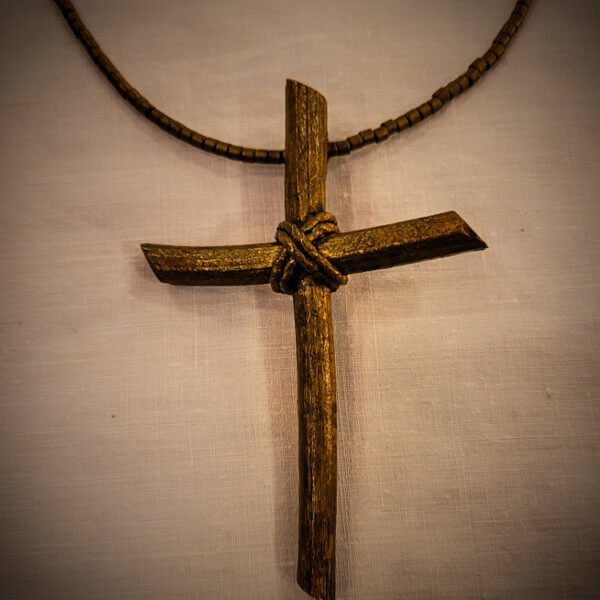
On Meanings of the Cross
When they came to the place that is called The Skull, they crucified Jesus[a] there with the criminals, one on his right and one on his left. [[34 Then Jesus said, “Father, forgive them, for they do not know what they are doing.”]][b] And they cast lots to divide his clothing. 35 And the people stood by watching, but the leaders scoffed at him, saying, “He saved others; let him save himself if he is the Messiah[c] of God, his chosen one!” 36 The soldiers also mocked him, coming up and offering him sour wine 37 and saying, “If you are the King of the Jews, save yourself!” 38 There was also an inscription over him,[d] “This is the King of the Jews.”
39 One of the criminals who were hanged there kept deriding[e] him and saying, “Are you not the Messiah?[f] Save yourself and us!” 40 But the other rebuked him, saying, “Do you not fear God, since you are under the same sentence of condemnation? 41 And we indeed have been condemned justly, for we are getting what we deserve for our deeds, but this man has done nothing wrong.” 42 Then he said, “Jesus, remember me when you come in[g] your kingdom.” 43 He replied, “Truly I tell you, today you will be with me in paradise.”
Today I would like to share some thoughts about the meaning of the cross.
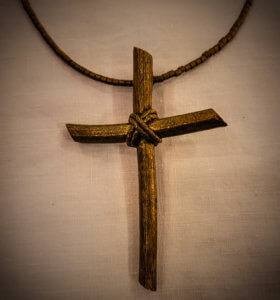 What does the cross mean to you? Since being ordained, I’ve gotten many crosses. For every one there is a story. What dear friend gave it to me. Or why I chose it. What it tells me about the faith of those who made it; why I treasure it and keep it. Most precious of all is this pectoral cross I’m wearing today. It was designed by my sculptor friend, Chloë Gunn Blackburn. She made it out of geranium stalks and twine, then had it cast in bronze and silver as a gift for my ordination. Chloë is the beloved elder whom we visit in London.
What does the cross mean to you? Since being ordained, I’ve gotten many crosses. For every one there is a story. What dear friend gave it to me. Or why I chose it. What it tells me about the faith of those who made it; why I treasure it and keep it. Most precious of all is this pectoral cross I’m wearing today. It was designed by my sculptor friend, Chloë Gunn Blackburn. She made it out of geranium stalks and twine, then had it cast in bronze and silver as a gift for my ordination. Chloë is the beloved elder whom we visit in London.
When I really look at the crosses I have, touch them, hold them, wear them, they mean many things to me. They can transport my spirit to dear memories and sacred places in the heart, filled with peace and blessing.
Horrendous Reality
Two thousand years ago, the cross meant one thing only. It was a horrendous reality. Nothing cherished to hold or contemplate, but a life-sized instrument of humiliation, torture, and agonizing death. The particular pain of crucifixion was such that it became an adjective in Latin and entered our language about five hundred years ago as a word we all know: “excruciating”. The cross was so abhorrent a symbol that it was not used in Christian art until three hundred years after Jesus died–when the Roman Emperor Constantine had banned crucifixion and elevated the Christian faith as his own.
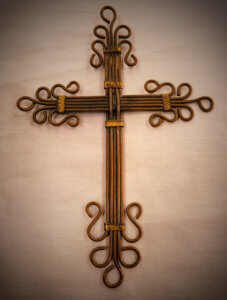 None of the gospels spells out Jesus physical suffering. They didn’t need to. Living under Roman rule themselves, the early Christians had seen its horrors. Crucifixion was a public event, staged as a deterrent all around the Roman Empire. A display of ruthless power, it was the punishment for treason and murder, meted out to the hoi polloi, people from the common masses, not to Roman citizens.
None of the gospels spells out Jesus physical suffering. They didn’t need to. Living under Roman rule themselves, the early Christians had seen its horrors. Crucifixion was a public event, staged as a deterrent all around the Roman Empire. A display of ruthless power, it was the punishment for treason and murder, meted out to the hoi polloi, people from the common masses, not to Roman citizens.
Our short gospel reading tells about Jesus’ time on the cross, ending before Jesus speaks his final words and breathes his last. Like the other synoptic accounts, it paints a harrowing picture of the cruel derision, the mockery, and the scorn that Jesus endured from the leaders, the soldiers, and even one of the thieves being crucified beside him.
Hateful insults fill the air, but Jesus has the first word, and the last. Those words—unique to Luke’s account–show that his faith has lifted him above it all.
Jesus said: “Father, forgive them; for they do not know what they are doing”.
“…they do not know what they are doing.”
Nor did they. None of them.
Pawns
First, most of them didn’t really know who they were themselves. The soldiers were pawns in a huge authoritarian system—a network of oppression through which the Roman Empire maintained its power. When Augustus established the Empire about thirty years before Jesus’ birth, he had, indeed, brought peace to Rome’s vast territories in Europe and around the Mediterranean. That peace, the Pax Romana, lasted over two hundred years because it was continually enforced at the local level—brutally, if necessarily. The soldiers at the cross probably thought that what they were doing was keeping the peace.
But that wasn’t all.
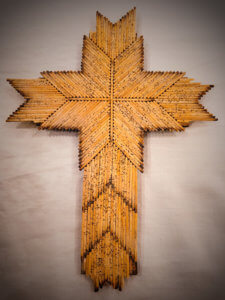 Pontius Pilate knew who he was, of course: the governor of Roman Judea. Judea was a notoriously unruly small province on the Eastern edge of the Empire. Pilate’s job was enforcing the peace. Jesus’ challenge to the Temple authorities had led to civil disorder at the feast of the Passover, just when Jerusalem was filled with Jews from other lands. Pilate had no qualms about killing a simple Galilean rabbi to put an end to it. That, he thought, was what he was doing.
Pontius Pilate knew who he was, of course: the governor of Roman Judea. Judea was a notoriously unruly small province on the Eastern edge of the Empire. Pilate’s job was enforcing the peace. Jesus’ challenge to the Temple authorities had led to civil disorder at the feast of the Passover, just when Jerusalem was filled with Jews from other lands. Pilate had no qualms about killing a simple Galilean rabbi to put an end to it. That, he thought, was what he was doing.
But, that wasn’t all.
None of them could really know what they were doing. Not even the disciples, witnessing from a distance. Because none of them knew who Jesus really was. Even the people who believed Jesus was the Messiah didn’t really know what that meant.
It would be revealed after Jesus rose from the dead—and then only to a few of them.
So none of them knew that what they were really doing. What they were doing was taking part in the key event in God’s plan for the salvation of the world.
Even Jesus may not have known completely. But he had faith, grounded in Hebrew scriptures, the Psalms and the prophets like Jeremiah: faith in God’s righteousness, in God’s dominion over all, and God’s peace transcending time and space. Jesus trusted that in the end God would prevail over any and all earthly powers.
Jesus’ words in Luke reflect the depth of his faith.
“Father forgive them…
“Today you will be with me in Paradise.”
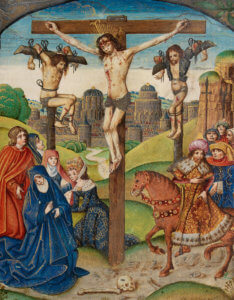 Only in Luke do we read that the other two men on the cross actually spoke. One joined in the mocking; the other, whom we call ‘the good thief,’ defended Jesus. Then he added: “Jesus, remember me when you come into your kingdom”.
Only in Luke do we read that the other two men on the cross actually spoke. One joined in the mocking; the other, whom we call ‘the good thief,’ defended Jesus. Then he added: “Jesus, remember me when you come into your kingdom”.
Jesus replied: “Truly I tell you, today you will be with me in Paradise.”
“Father, forgive them…
“Today you will be with me in Paradise.”
As you know, the gospels all were written separately–in different places for different communities. Mark, written first, was the model for Matthew and Mark both of which include many of their source’s details. But each emphasizes different aspects of Jesus’ ministry, and imparts a different sense of his character.
Luke’s account of this climactic moment diverges significantly from Mark’s, which Matthew followed very closely. It’s all in Jesus’ words—in those that he says and those that he does not say.
As I noted before, in Luke alone Jesus prays aloud for God to forgive those who have condemned, mocked, tortured and crucified him. And only in Luke, Jesus promised the ‘good thief’ that Paradise awaits them both.
Even on the cross, Luke’s Jesus reached out selflessly to others—embodying God’s love for them all.
There’s another important difference at the very end—a few verses after our text. In Mark and Matthew, Jesus cries out: “My God, my God, why have you forsaken me?”
Not in Luke. There, instead, Jesus says, “Father, into your hands I commend my Spirit.”
“Father, into your hands I commend my Spirit.”
You see the difference. Jesus words in Luke express his unwavering faith in God’s loving presence in every moment, and in God’s providence, even in the throes of death. Those same words have given courage to Christian martyrs down through the ages to our own day.
Every one of us has to endure periods of suffering in body, mind, or spirit.
In those times, as Paul wrote to the Colossians:
may we “be made strong with all the strength that comes from God’s glorious power”
Following Jesus’ example, let us open our hearts to receive and share God’s ever present love, so that whatever cross we have to bear can be blessed, and, perhaps, even become a portal to Paradise.
